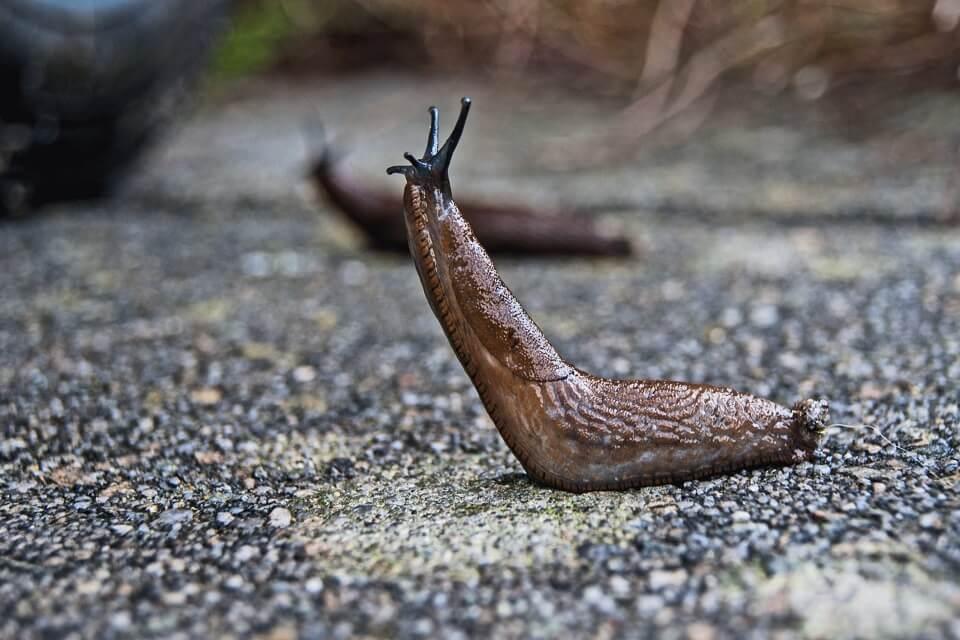It's one thing having to battle to keep slugs from eating our garden plants, but how do we stop slugs in the house? How can we get rid of slugs indoors if they have found their way in? We consulted Hayley Jones, entomologist at the RHS, and asked for her advice on how to stop slugs getting in the house.
Hayley tells us which slug to keep an eye out for. "The slug that is usually the culprit in indoor sightings is the Yellow Cellar Slug 'Limacus Flavus', which is a medium sized slug (up to 13cm long), slender with pale mottling on a yellow, green or tan body."
Remember that slugs don't have any bones so they are able to slip through even very small holes.
Slugs will come inside for something they need, likely warmth or shade. So, knowing what attracts them could help keep them at bay. "The Yellow Cellar slug mostly eats mould and algae but can also be found eating leftovers, pet food and compost.
"It is attracted to dark damp refuges such as vents and drains. It is strictly nocturnal, which is why often only the mucous trails are seen in unexpected indoor places, the slug having already retreated by the morning."
If you find a slimy slug trail, use a torch to highlight the path and track it back to its entrance point into the house.
For external doors, block gaps with a draught excluder.
For larger gaps and cracks, block with a more permanent foam filler. See products below.
Hayley highlights that "stopping slugs coming inside can be a bit tricky. The obvious solution is to block up the route, but if that is an old fashioned vent or something like that it may not be possible."
1. Copper tape
Copper tape is a well-known way to protect plants and pots from slugs and snails in the garden but it can also be used indoors. The texture of the tape creates a small charge when the slugs touch it which doesn't harm them but does deter them.

"Inside, you could use some of the barriers recommended for protecting pots, one that would suit this use well is copper tape," says Hayley.
2. Salt
If you have found a slug trail in your kitchen or bathroom, trace it back to the entry point and fill it with salt to deter them slugs coming through the hole again.
"Salt can be a very good barrier," says Hayley. "But this will only be worth it if you can create the barrier somewhere dry, otherwise it will wash away quickly and may make the soil in the nearby area, or the surface, too salty."
3. Ducks and slug predators in the garden
"A great thing to think about is how you can make your garden more friendly to the natural predators of slugs and snails," Hayley explains. "Provide food and water for birds, and install a 'hedgehog highway' hole if you don't have one already. A pond is a great wildlife-friendly addition to a garden, and will attract frogs and toads that will help keep your slug numbers down."
A great natural predator of slugs is ducks – although they will also eat your lettuce seedlings so keep them protected until the plants have matured.
We did a bit more research and found a couple more helpful products that claim to help prevent slugs coming inside the house:
4. Slug trap
Slug trap often lure in the animal using beer or a sugary liquid. Once inside, they find it hard to navigate their way back out again. This can be a humane way to get rid of slugs in the house but make sure you empty the trap far enough away for you house so they won't come back in. You can also make your own beer trap by filling a container half full with beer and leaving is near a problem area. You cannot guarantee the slugs will survive if using a homemade trap.
5. Wool pellets
Wool pellets are a great organic way to deter slugs in the garden and they can also be used to block entry points into the house. Wool is a natural material so is not harmful and it breaks down naturally.
6. Sharp barriers
The soft body of a slug finds it uncomfortable to travel over rough surfaces to creating a natural barrier using egg shells or garden cuttings can be effective.
7. Plant slug repelling plants
Astrantia gives off a scent that repels slugs and snails and so acts as a natural pesticide. Wormwood, rue, fennel, anise and rosemary all have the same effect.
8. Put up bird feeders
Encouraging birds into your garden who prey on slugs is a great natural repellent. It will improve the biodiversity of your garden as well as making it less likely slugs will enter your home. Here's our selection of nine squirrel-proof bird feeders for your garden.
9. Reseal windows and doors
Survey the windows and doors in your house and reseal any areas that may have become loose and created holes.
10. Diatomaceous earth (silicon dioxide)
The name of this substance might make it sound serious and harmful but diatomaceous earth is a type of silica that works by drawing out oils in insects and so drying them out. It can be an irritant for humans so avoid breathing it in.
Like this article? Sign up to our newsletter to get more articles like this delivered straight to your inbox.SIGN UP
Looking for some positivity? Get Country Living magazine posted through your letterbox every month. SUBSCRIBE NOW